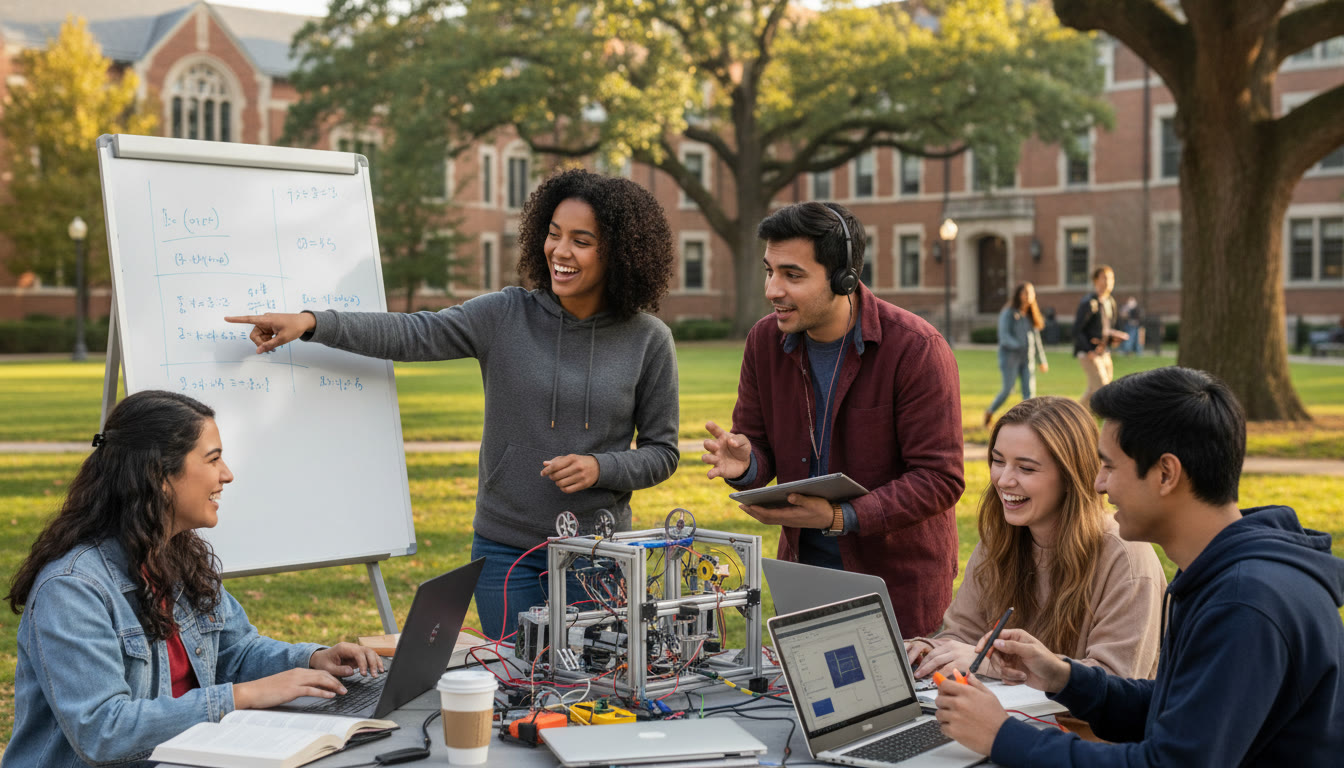Introduction: Why APs Matter for George Mason and Volgenau Engineering
If you’re aiming for George Mason University — and especially the Volgenau School of Engineering — Advanced Placement (AP) courses and exams are more than just resume ornaments. They’re tools: proof that you’ve grappled with college-level content, evidence of academic curiosity, and a way to demonstrate you’re ready for rigorous engineering coursework. For families and students navigating the path, this guide is a practical, human road map: what to study, how to balance depth and breadth, and how to make your application reflect not just grades, but potential.

Understanding Volgenau: What the School Values
Volgenau’s reputation centers on hands-on problem solving, interdisciplinary thinking, and technical creativity. While each engineering program has its own flavor — computer engineering leans into software and circuits, systems engineering emphasizes modeling and design — a through-line is clear: students who succeed thrive on strong math foundations, curiosity-driven projects, and the ability to communicate technical ideas.
AP courses are one of the clearest ways to show that foundation. A strong AP profile tells admissions committees you’ve handled relevant subjects already, and in some cases can earn you college credit or allow you to place into higher-level courses once you matriculate.
Which APs Matter Most for Prospective Volgenau Students
- AP Calculus AB/BC — cornerstone for virtually every engineering major.
- AP Physics (1, 2, or C) — especially useful: Physics C is ideal for mechanics and electricity & magnetism.
- AP Computer Science A — valuable for computer engineering and interdisciplinary projects.
- AP Statistics — helpful for data-driven engineering fields and research methodology.
- AP Chemistry — useful for chemical engineering tracks or materials science interests.
Tip: Depth beats breadth. Two or three APs deeply pursued (with strong scores) often make a better impression than a scattershot list of many APs with mediocre results.
How AP Scores Translate to Matriculation and Placement
Policies change from time to time and can vary by department, but the general pattern holds: AP scores can translate into college credit or advanced placement, helping you skip introductory classes and move into more advanced, major-focused coursework sooner. For Volgenau students, that can mean earlier access to upper-level labs, research opportunities, or elective specializations.
| AP Exam | Common Use for Engineering Students | Typical Score Needed |
|---|---|---|
| Calculus AB | Credit for first-semester calculus or placement into second semester | 4–5 |
| Calculus BC | Credit for two-semester calculus sequence or placement into multivariable calculus | 4–5 |
| Physics C | Placement in mechanics or E&M courses | 4–5 |
| Computer Science A | Placement in introductory programming or credit in CS electives | 4–5 |
Remember: exact credit and placement rules are set by the university and can differ by major. If credit translates to fewer required courses, you gain flexibility: double majors, study abroad, co-ops, or undergraduate research become more realistic options.
Crafting an AP Strategy: Timing, Workload, and Balance
One big mistake students make is trying to load every AP in a single year. The smarter strategy is intentional sequencing: build a foundation early, add rigor as you go, and preserve time for meaningful extracurriculars.
Sample AP Timeline for an Aspiring Volgenau Applicant
- Freshman Year: Focus on strong study habits; take honors math if available.
- Sophomore Year: AP-level intro courses (AP Computer Science Principles if available, AP Statistics) — explore computing and data basics.
- Junior Year: AP Calculus (AB or start BC), AP Physics 1 or AP Physics C depending on preparation.
- Senior Year: AP Calculus BC (if not taken earlier), AP Physics C, and a complementary science AP like Chemistry or Environmental Science.
This sequence keeps your junior year — a key application year — full of strong, visible rigor, while senior year shows continued commitment and allows you to finish with high grades.
Managing Workload Without Burning Out
- Prioritize deep understanding over memorization. Engineering programs reward problem-solving, not just rote formulas.
- Keep one or two major commitments outside class that you truly care about (robotics, math team, research internship). Depth shows more than a long list of clubs.
- Use focused study blocks: 45–90 minute sessions followed by short breaks.
- Lean on targeted support when needed — a short series of 1-on-1 sessions can be far more effective than months of unfocused studying.
Study Techniques That Engineers Love
Engineering learning is active: you build, test, fix, and iterate. Translate that to AP prep and you’ll both retain more and enjoy the process.
Active Study Methods
- Practice problems first: Tackle a representative problem before re-reading the theory. Struggling with a problem forces targeted learning.
- Explain aloud: Teach a friend or record yourself solving a problem — explaining clarifies thought.
- Mixed practice: Intersperse different problem types in a single session to build flexible skills.
- Simulate test conditions: Timeed practice with no notes prepares you mentally for exam pacing.
Putting Together a Strong Application for Volgenau
Transcripts and test scores matter — but so do context and narrative. Volgenau admissions reviewers look for students who will contribute to a collaborative, creative engineering community.
How to Tell Your Story
- Highlight projects: A robotics project, a personal coding portfolio, or a science fair design shows applied curiosity.
- Connect AP coursework to real interests: In essays, explain how AP Calculus sharpened your problem-solving or how AP Physics inspired a specific project.
- Show growth: Admissions teams weigh improvement — a strong upward trend often says more than a single perfect year.
Letters and Recommendations
Choose teachers who can speak concretely about your technical problem-solving, lab skills, or collaborative leadership. A teacher who supervised a long-term project or mentored you in an extra lab can write the kind of specific anecdote that resonates.
Real-World Example: Turning an AP Class Into a Portfolio Piece
Imagine Maya, a prospective systems engineer. In AP Physics C she designed a small automated balance that weighed objects and logged data. She used AP Computer Science A to write the program that collected and visualized that data. On her application she wrote about the iteration cycle — how a failed sensor calibration led to a better design — and uploaded code snippets and a short video demo. That narrative shows technical skill, resilience, and communication — the exact blend Volgenau values.
How Personalized Tutoring Can Move the Needle
Sometimes a pulse of focused help is all that separates good from great. Tailored tutoring — not generic lectures — addresses gaps efficiently, builds confidence, and creates a study plan that fits your life. Sparkl’s personalized tutoring approach, for example, emphasizes 1-on-1 guidance, tailored study plans, expert tutors, and AI-driven insights to track progress and adapt lessons. That combination can help you master tricky AP concepts, perform consistently on practice exams, and present your best academic self to admissions readers.
What Effective Tutoring Looks Like
- Diagnostic-first: Start with a clear picture of strengths and weaknesses.
- Small, measurable goals: Each session targets one or two specific skills.
- Integration with projects: Tutoring that helps you apply AP learning to portfolio work (coding, lab write-ups) multiplies impact.
- Progress data: Regular check-ins and progress snapshots keep motivation high.
Preparing for the AP Exam Day and College Transition
AP exam day is as much about mental preparation as content. You want to be calm, efficient, and practiced in exam strategies.
Checklist for Exam Day
- Know the format: Multiple choice vs. free response, time per section, calculator rules.
- Simulate conditions: Take at least two full-length timed practice exams.
- Plan logistics: Know test location, arrive early, bring permitted calculators and IDs.
- Rest: The best single preparation the night before is a good sleep cycle, not last-minute cramming.
Transitioning to College-Level Engineering
Once enrolled, use AP credit strategically. Skipping intro courses can be tempting, but sometimes taking a foundational class is a good way to acclimate to college expectations and find study groups. Meet advisors early and be strategic: if skipping a course unlocks a coveted upper-level elective or research opportunity, that’s often the right choice.
Financial and Practical Considerations
AP credits can reduce the overall course load required for graduation, potentially saving tuition and enabling meaningful experiences like internships or study abroad. If your AP scores translate into credits, talk with your academic advisor and map out a 4-year plan that leverages those credits.
| Benefit | How It Helps | Action |
|---|---|---|
| Advanced Placement | Place into higher-level coursework sooner | Confirm department policies and meet advisor |
| Credit Reduction | Fewer required courses, more flexibility | Plan electives, minors, or study abroad earlier |
| Cost Savings | Potentially shorten time to degree | Map credits to required courses |
Common Mistakes Students Make — And How to Avoid Them
- Loading too many APs without depth — choose rigor that you can sustain while pursuing meaningful projects.
- Neglecting labs and projects — engineering is applied; coursework without application is incomplete.
- Assuming AP credit is always best — in some cases, taking the college course provides a smoother transition.
- Overlooking narrative — grades and scores matter, but a clear story about what you love and why you’re built for engineering creates connection.
Putting It All Together: A Sample 4-Year Plan
The following is a sample plan for a student targeting Volgenau. It balances academic rigor, project work, and rest — because sustainable effort beats intermittent heroics.
| Year | Academics | Projects & Activities | Goal |
|---|---|---|---|
| Freshman | Honors Algebra/Geometry; Intro Science | Join robotics club or coding meetup | Explore interests; build study routine |
| Sophomore | Precalculus or AP Statistics; AP Computer Science Principles | Start small engineering project; summer coding camp | Develop foundational skills |
| Junior | AP Calculus AB/BC; AP Physics 1 or C | Lead a project, science fair, or internship | Show sustained rigor; prepare for applications |
| Senior | AP Physics C; AP Chemistry or advanced CS | Polish portfolio; complete capstone project | Submit strong application with clear narrative |
Final Thoughts: Confidence, Craft, and Curiosity
Getting into Volgenau — and thriving there — is about more than ticking boxes. It’s about the kind of curiosity that drives you to solve a problem at 2 a.m., the empathy to work with teammates when things break, and the discipline to learn from mistakes. AP courses are powerful signals of readiness when chosen and completed thoughtfully.
If you or your student want targeted help — whether that’s nailing AP Calculus, building a coding portfolio, or crafting an application narrative — consider a focused, personalized approach. Services like Sparkl’s personalized tutoring combine 1-on-1 guidance, tailored study plans, expert tutors, and AI-driven insights to keep learning efficient and motivating. Used well, that kind of support helps you show your best self to admissions and, more importantly, prepares you to succeed once you arrive on campus.
Next Steps
- List the APs you plan to take and map them to your intended major.
- Create a simple timeline for projects and tests; prioritize two deep commitments outside class.
- Schedule a diagnostic or mock exam to identify gaps and plan targeted study.
- Start compiling a portfolio with code, project reports, or lab write-ups.
Remember: the path to Volgenau is built day by day, problem by problem. Be deliberate, stay curious, and don’t be afraid to ask for help when you need it. With the right strategy, your AP experience can be a springboard — not just to college credit, but to real engineering confidence.

Closing Note to Parents
Your support — helping craft balance, encouraging depth over breadth, and guiding toward meaningful tutoring when necessary — can make a profound difference. Celebrate progress, not perfection, and help your student shape a story that reflects genuine interest in engineering. That narrative, combined with strong AP preparation and thoughtful projects, will make any Volgenau application stand out for the right reasons.
Good luck — and remember: engineering is a craft practiced one problem at a time.
















No Comments
Leave a comment Cancel